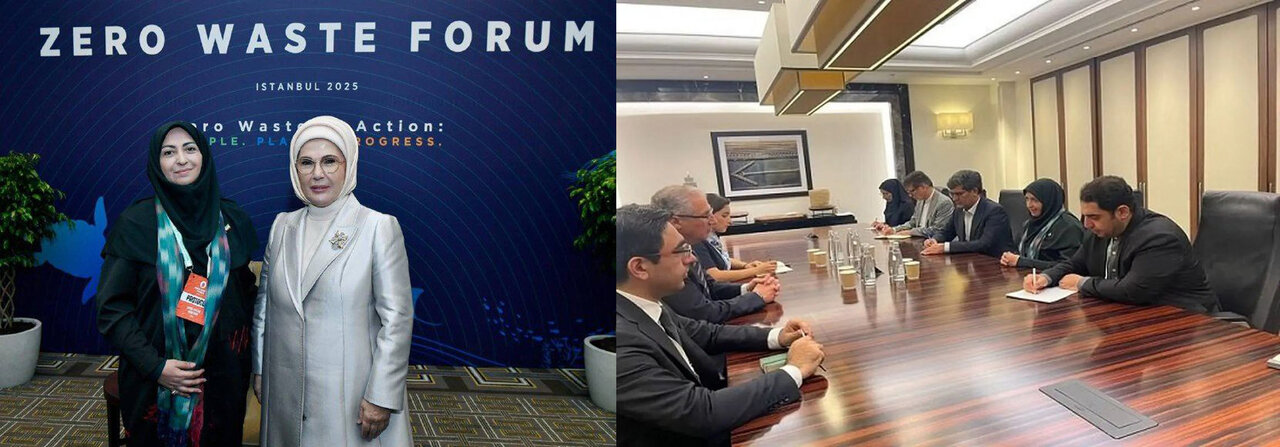DOE discusses environmental issues with Turkey, Azerbaijan

TEHRAN – Shina Ansari, the head of the Department of Environment, in separate meetings with Emine Erdoğan, the first lady of Turkey, and Mukhtar Babayev, the Azerbaijani Minister of Ecology and Natural Resources, explored avenues to promote cooperation in the environment sector.
On the sidelines of the global Zero Waste Forum, being held in Istanbul, Turkey, from October 17 to 19, Ansari and Erdoğan underlined fostering environmental collaborations and sharing experiences.
“Promoting cooperation with neighboring countries, particularly in the environment sector, will lay the ground for regional and international peace,” doe.ir quoted Erdoğan as saying.
Highlighting the importance of the shared environment challenges, the official said the environment, from land to air and sea, connects countries. Erdoğan commended Iran’s valuable experiences in the field of environment and announced Turkey’s readiness to cooperate with Iran in all fields.
For her part, Ansari said waste management is among the top priorities of the DOE; Iran is willing to benefit from international expertise, including Turkey's successful experiences. She proposed developing ties in preserving biodiversity and protected areas.
Also, the Azerbaijani official highlighted expanding bilateral and regional ties in the environment sector. Referring to former talks with the head of the DOE, Babayev underscored the significance of sustained dialogues and the implementation of previous agreements. The officials also agreed to develop a joint action to preserve the Hyrcanian forests against climate change.
The global Zero Waste Forum is organized by the Zero Waste Foundation and Turkish ministries, and is centered on the theme of ‘People, Places, Progress’.
The three-day event will focus on different topics, such as transforming policy into tangible action, scaling up effective solutions, mobilizing financial resources, and forging strong international alliances to tackle waste globally.
The forum will provide great opportunities for enhancing environmental interactions between Iran and other countries.
Environmental diplomacy
Being transboundary, many complicated environmental challenges can be addressed through environmental diplomacy, which means negotiations among two or more countries.
Environmental diplomacy is used globally to settle problems such as conflicts over sources of energy, water, and climate change, IRNA reported.
The fact that all the countries share the same environment necessitates fostering environmental diplomacy to settle disputes over water resources, environmental pollution, and climate change impacts.
Environmental diplomacy is an effective and required tool to mitigate and eliminate the severe consequences by fair distribution of responsibilities among involved countries as they present their national interests and solutions.
Sand and dust storms (DSDs) are a typical example of meteorological hazards in West Asia, where many countries are involved, as some generate them and some others are affected by them.
SDSs hit countries such as Saudi Arabia, Iraq, Syria, Turkey, Iran, and sometimes parts of Azerbaijan, Turkmenistan, and even Afghanistan and Pakistan.
These dust particles have devastating impacts on respiratory health and ecosystems; they result in the closure of airports, schools, and offices, affect electricity transmission infrastructures, and bring about economic losses.
Removing pollution from the Aras River and securing the Hirmand River water rights, as well as some wetlands, are other examples where environmental policies have been used to resolve the conflicts.
Tehran Convention is a big achievement whereby the Caspian Sea littoral states protect the Caspian environment from all sources of pollution, but also targets the preservation, restoration, and protection of the Caspian Sea species and habitats.
Therefore, to mitigate climate change impacts and achieve sustainable development goals, environmental policy is required to be strengthened to help Iran, as well as its neighboring countries, benefit from available resources and secure our rights at the international level.
Ministry of Foreign Affairs, in cooperation with other executive bodies such as the ministries of energy, industry, and agriculture, as well as the Department of Environment, can establish a center to focus on specific missions and follow up on discussions and goals in line with national interests and improve the living conditions of citizens through environmental diplomacy.
MT/MG
Leave a Comment